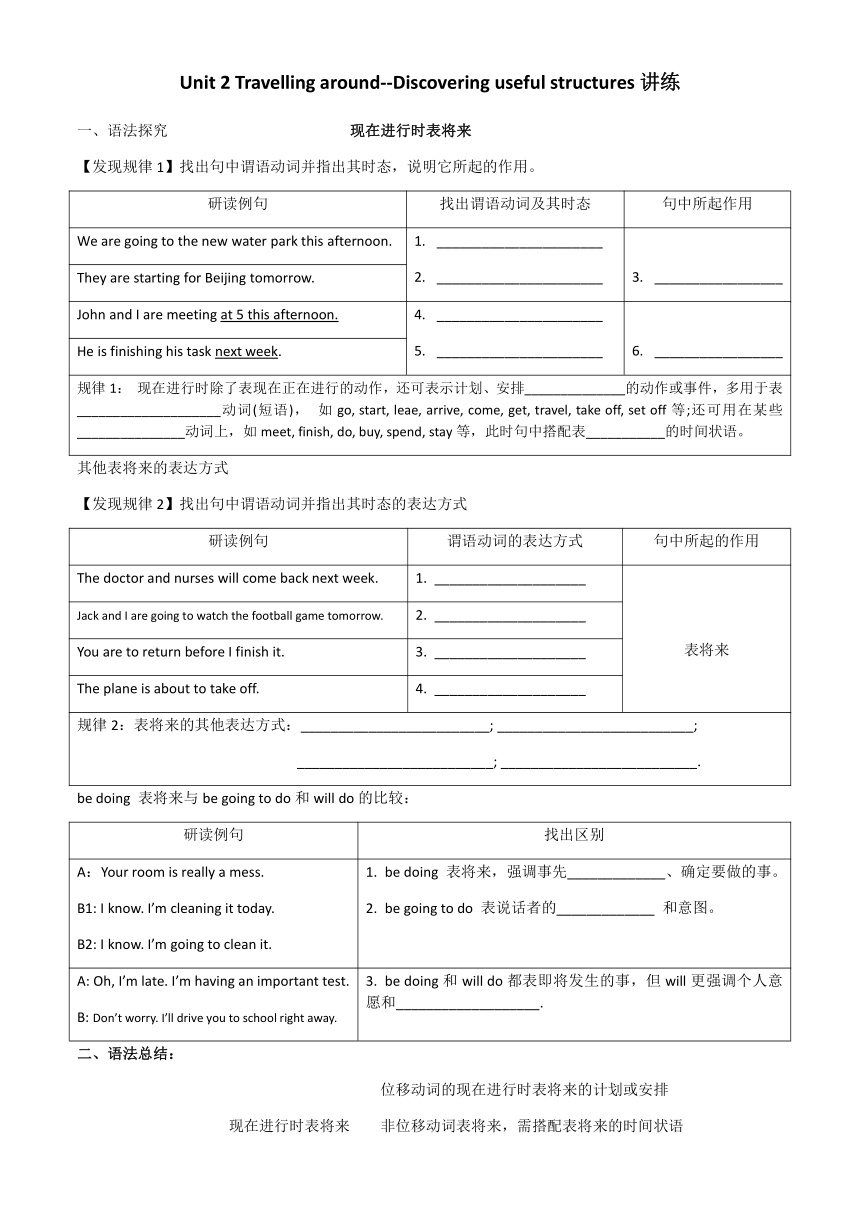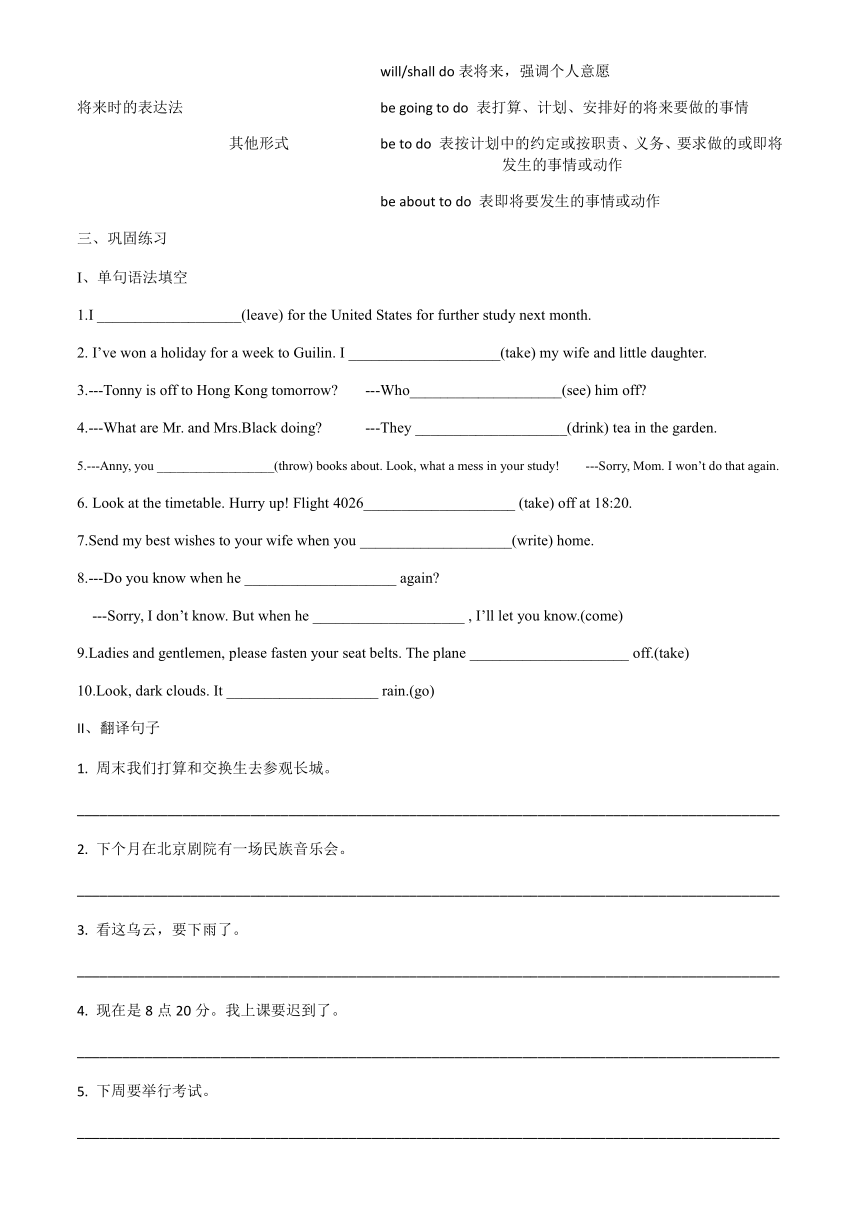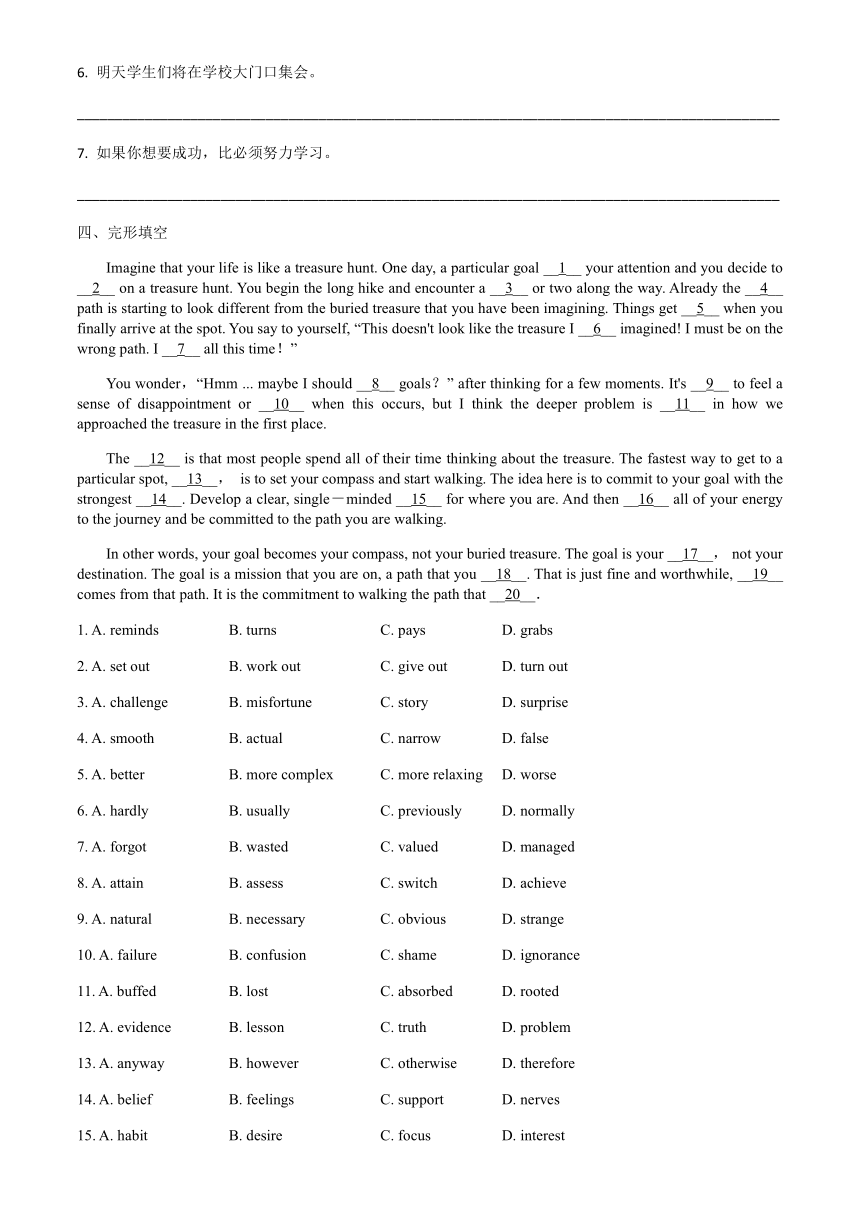人教版(2019)必修第一册Unit 2 Travelling around--Discovering useful strutures 讲练 (含答案)
文档属性
| 名称 | 人教版(2019)必修第一册Unit 2 Travelling around--Discovering useful strutures 讲练 (含答案) |  | |
| 格式 | docx | ||
| 文件大小 | 22.6KB | ||
| 资源类型 | 教案 | ||
| 版本资源 | 人教版(2019) | ||
| 科目 | 英语 | ||
| 更新时间 | 2021-08-26 17:07:49 | ||
图片预览



文档简介
Unit
2
Travelling
around--Discovering
useful
structures讲练
一、语法探究
现在进行时表将来
【发现规律1】找出句中谓语动词并指出其时态,说明它所起的作用。
研读例句
找出谓语动词及其时态
句中所起作用
We
are
going
to
the
new
water
park
this
afternoon.
______________________
______________________
_________________
They
are
starting
for
Beijing
tomorrow.
John
and
I
are
meeting
at
5
this
afternoon.
______________________
______________________
_________________
He
is
finishing
his
task
next
week.
规律1:
现在进行时除了表现在正在进行的动作,还可表示计划、安排______________的动作或事件,多用于表____________________动词(短语),
如go,
start,
leae,
arrive,
come,
get,
travel,
take
off,
set
off等;还可用在某些_______________动词上,如meet,
finish,
do,
buy,
spend,
stay等,此时句中搭配表___________的时间状语。
其他表将来的表达方式
【发现规律2】找出句中谓语动词并指出其时态的表达方式
研读例句
谓语动词的表达方式
句中所起的作用
The
doctor
and
nurses
will
come
back
next
week.
____________________
表将来
Jack
and
I
are
going
to
watch
the
football
game
tomorrow.
____________________
You
are
to
return
before
I
finish
it.
____________________
The
plane
is
about
to
take
off.
____________________
规律2:表将来的其他表达方式:_________________________;
__________________________;
__________________________;
__________________________.
be
doing
表将来与be
going
to
do和will
do的比较:
研读例句
找出区别
A:Your
room
is
really
a
mess.
B1:
I
know.
I’m
cleaning
it
today.
B2:
I
know.
I’m
going
to
clean
it.
be
doing
表将来,强调事先_____________、确定要做的事。
be
going
to
do
表说话者的_____________
和意图。
A:
Oh,
I’m
late.
I’m
having
an
important
test.
B:
Don’t
worry.
I’ll
drive
you
to
school
right
away.
be
doing和will
do都表即将发生的事,但will更强调个人意愿和___________________.
二、语法总结:
位移动词的现在进行时表将来的计划或安排
现在进行时表将来
非位移动词表将来,需搭配表将来的时间状语
will/shall
do表将来,强调个人意愿
将来时的表达法
be
going
to
do
表打算、计划、安排好的将来要做的事情
其他形式
be
to
do
表按计划中的约定或按职责、义务、要求做的或即将
发生的事情或动作
be
about
to
do
表即将要发生的事情或动作
三、巩固练习
I、单句语法填空
1.I
___________________(leave)
for
the
United
States
for
further
study
next
month.
2.
I’ve
won
a
holiday
for
a
week
to
Guilin.
I
____________________(take)
my
wife
and
little
daughter.
3.---Tonny
is
off
to
Hong
Kong
tomorrow?
---Who____________________(see)
him
off?
4.---What
are
Mr.
and
Mrs.Black
doing?
---They
____________________(drink)
tea
in
the
garden.
5.---Anny,
you
__________________(throw)
books
about.
Look,
what
a
mess
in
your
study!
---Sorry,
Mom.
I
won’t
do
that
again.
6.
Look
at
the
timetable.
Hurry
up!
Flight
4026____________________
(take)
off
at
18:20.
7.Send
my
best
wishes
to
your
wife
when
you
____________________(write)
home.
8.---Do
you
know
when
he
____________________
again?
---Sorry,
I
don’t
know.
But
when
he
____________________
,
I’ll
let
you
know.(come)
9.Ladies
and
gentlemen,
please
fasten
your
seat
belts.
The
plane
_____________________
off.(take)
10.Look,
dark
clouds.
It
____________________
rain.(go)
II、翻译句子
1.
周末我们打算和交换生去参观长城。
_____________________________________________________________________________________________
下个月在北京剧院有一场民族音乐会。
_____________________________________________________________________________________________
看这乌云,要下雨了。
_____________________________________________________________________________________________
现在是8点20分。我上课要迟到了。
_____________________________________________________________________________________________
下周要举行考试。
_____________________________________________________________________________________________
明天学生们将在学校大门口集会。
_____________________________________________________________________________________________
如果你想要成功,比必须努力学习。
_____________________________________________________________________________________________
四、完形填空
Imagine
that
your
life
is
like
a
treasure
hunt.
One
day,
a
particular
goal
__1__
your
attention
and
you
decide
to
__2__
on
a
treasure
hunt.
You
begin
the
long
hike
and
encounter
a
__3__
or
two
along
the
way.
Already
the
__4__
path
is
starting
to
look
different
from
the
buried
treasure
that
you
have
been
imagining.
Things
get
__5__
when
you
finally
arrive
at
the
spot.
You
say
to
yourself,
“This
doesn't
look
like
the
treasure
I
__6__
imagined!
I
must
be
on
the
wrong
path.
I
__7__
all
this
time!”
You
wonder,“Hmm
...
maybe
I
should
__8__
goals?”
after
thinking
for
a
few
moments.
It's
__9__
to
feel
a
sense
of
disappointment
or
__10__
when
this
occurs,
but
I
think
the
deeper
problem
is
__11__
in
how
we
approached
the
treasure
in
the
first
place.
The
__12__
is
that
most
people
spend
all
of
their
time
thinking
about
the
treasure.
The
fastest
way
to
get
to
a
particular
spot,
__13__,
is
to
set
your
compass
and
start
walking.
The
idea
here
is
to
commit
to
your
goal
with
the
strongest
__14__.
Develop
a
clear,
single-minded
__15__
for
where
you
are.
And
then
__16__
all
of
your
energy
to
the
journey
and
be
committed
to
the
path
you
are
walking.
In
other
words,
your
goal
becomes
your
compass,
not
your
buried
treasure.
The
goal
is
your
__17__,
not
your
destination.
The
goal
is
a
mission
that
you
are
on,
a
path
that
you
__18__.
That
is
just
fine
and
worthwhile,
__19__
comes
from
that
path.
It
is
the
commitment
to
walking
the
path
that
__20__.
1.
A.
reminds
B.
turns
C.
pays
D.
grabs
2.
A.
set
out
B.
work
out
C.
give
out
D.
turn
out
3.
A.
challenge
B.
misfortune
C.
story
D.
surprise
4.
A.
smooth
B.
actual
C.
narrow
D.
false
5.
A.
better
B.
more
complex
C.
more
relaxing
D.
worse
6.
A.
hardly
B.
usually
C.
previously
D.
normally
7.
A.
forgot
B.
wasted
C.
valued
D.
managed
8.
A.
attain
B.
assess
C.
switch
D.
achieve
9.
A.
natural
B.
necessary
C.
obvious
D.
strange
10.
A.
failure
B.
confusion
C.
shame
D.
ignorance
11.
A.
buffed
B.
lost
C.
absorbed
D.
rooted
12.
A.
evidence
B.
lesson
C.
truth
D.
problem
13.
A.
anyway
B.
however
C.
otherwise
D.
therefore
14.
A.
belief
B.
feelings
C.
support
D.
nerves
15.
A.
habit
B.
desire
C.
focus
D.
interest
16.
A.
preserve
B.
improve
C.
research
D.
devote
17.
A.
dream
B.
motto
C.
direction
D.
schedule
18.
A.
follow
B.
show
C.
recommend
D.
demand
19.
A.
whichever
B.
whatever
C.
whoever
D.
whenever
20.
A.
deserves
B.
counts
C.
works
D.
gathers
参考答案:
语法探究:发现规律1:
1.
are
going
to
2.
are
starting
for
3.
表将来
4.
are
meeting
5.
is
finishing
6.
表将来
规律1:将要发生;位置移动;非位移;将来
发现规律2:
1.
will
come
back
2.
are
going
to
watch
3.
are
to
return
4.
is
about
to
take
off
规律2:will/shall
do;
be
going
to
do;
be
to
do;
be
about
to
do
找出区别:1.
计划好的安排
2.
打算
3.
瞬间决定
巩固练习I、1.
am
leaving
2.
am
taking
3.
is
seeing
4.
are
drinking
5.
are
always
throwing
Takes
7.
write
8.
will
come;
comes
9.
is
taking
10.
is
going
to
II、1.
We
are
going
to
visit
the
Great
Wall
with
the
exchange
students
this
weekend.
There
is
going
to
be
a
folk
music
concert
in
Beijing
Opera
Theater
next
month.
Look
at
the
dark
clouds.
It
is
going
to
rain.
Oh
,
it's
8:20.
I'm
going
to
be
late
for
my
class.
The
examination
is
to
take
place
next
week.
The
students
are
to
meet
at
the
school
gate
tomorrow.
If
you
are
to
succeed,
you
must
work
as
hard
as
possible.
完形填空:【文章大意】
本文为议论文。生活就像一次寻宝之旅,到头来我们会发现所寻之物并非所愿。问题的根源在于一开始我们就没有弄清楚该如何接近宝藏。在方向确定后,目标是指南针不再是宝藏;目标是方向,不再是归宿;目标是使命,是选择的道路。忠诚于自己所选的道路,尽心尽力,风雨兼程。
1.
【答案】D
【解析】此处指“一个特定的目标吸引了你的注意力”,grab“吸引(某人的注意)”符合语境。remind“提醒”。
2.
【答案】
A
【解析】
此处指你决定动身踏上这一寻宝之旅,set
out“动身”符合语境。work
out“锻炼身体;计算出”;give
out“分发”;turn
out“结果是”。
3.
【答案】A
【解析】
由“is
starting
to
look
different
from
the
buried
treasure”中的“different”以及“I
must
be
on
the
wrong
path”中的“wrong”可知,寻宝之旅遭受了挑战(challenge)。misfortune“不幸”。
4.
【答案】
B
【解析】
根据上下文尤其是空后的“path
is
starting
to
look
different
from
the
buried
treasure
that
you
have
been
imagining”可知,实际的(actual)道路和你之前想象的不一样。smooth“平坦的”;narrow“狭窄的”;false“错误的”。
5.
【答案】
D
【解析】
由下文中的“This
doesn't
look
like
the
treasure
I
__6__
imagined!
I
must
be
on
the
wrong
path”可知,最初你感到寻宝之旅发生变化,到最后情况变得更加糟糕(worse)。
6.
【答案】
C
【解析】
根据语境尤其是“path
is
starting
to
look
different
from
the
buried
treasure
that
you
have
been
imagining”可知,此处表示这和先前(previously)想象的不一样。
7.
【答案】
B
【解析】
由空前的“I
must
be
on
the
wrong
path”可知,此处表示自己走错了路,浪费(wasted)了这些时间。value“重视;珍视”;manage“努力完成”。
8.
【答案】
C
【解析】
由“I
must
be
on
the
wrong
path”可知,此处表示以为自己走错了路,所以没有找到想要的宝藏,故认为自己应改变(switch)目标。attain“获得”;assess“评价;评定”。
9.
【答案】
A
【解析】
根据行文逻辑可知,走错了路,寻错了宝,为此感到很失落是很正常的(natural)事。necessary“必要的”;obvious“明显的”;strange“奇怪的;陌生的”。
10.
【答案】
B
【解析】
由“maybe
I
should
__8__
goals”可知,你走错了路,找到的宝藏不是想要的,感觉要不要改变目标,这是一种困惑(confusion),故选B项。failure“失败”;shame“耻辱”;ignorance“无知”。
11.
【答案】
D
【解析】
根据语境可知,此处表示作者分析没有找到想要的宝藏的根源(rooted)在于一开始就没有弄清楚该如何接近宝藏。
12.
【答案】
D
【解析】
根据空后的“most
people
spend
all
of
their
time
thinking
about
the
treasure.
The
fastest
way
to
get
to
a
particular
spot,
__13__,
is
to
set
your
compass
and
start
walking”可知,花费所有的时间想宝藏而不设置好指南针再出发是问题(problem)所在。evidence“证据”;lesson“教训”;truth“真相”。
13.
【答案】
B
【解析】
参见上题
【解析】。
14.
【答案】
A
【解析】
根据下文中的“be
committed
to
the
path
you
are
walking”和“It
is
the
commitment
to
walking
the
path”并结合语境可知,你要专注于(focus)往哪里去,然后坚定地走下去,故此处表示你需要有最强的信念(belief)。
15.
【答案】
C
【解析】
参见上题
【解析】。desire“愿望;渴望”。
16.
【答案】
D
【解析】
根据语境可知,此处表示要倾尽所能,尽心尽力,风雨兼程。devote“献身;致力;专心”,符合语境。preserve“保存”;improve“改善”。
17.
【答案】
C
【解析】
文章最后一段是主旨的升华。结合文章主旨及选项可知,此处指目标是方向(direction),不是归宿。motto“箴言;格言”;schedule“日程安排”。
18.
【答案】
A
【解析】
由上文中的“be
committed
to
the
path
you
are
walking”可知,目标是一个使命,是一条需要遵循(follow)的道路。recommend“推荐”;demand“要求”。
19.
【答案】
B
【解析】
此处指不论这条道路上有什么,那都很好,也很值得。whatever“无论什么”符合语境。
20.
【答案】
B
【解析】
根据空前一句可知,忠诚于自己所选的道路,尽心尽力才是最重要的。count“重要”符合语境。deserve“值得”;gather“聚集”。
2
Travelling
around--Discovering
useful
structures讲练
一、语法探究
现在进行时表将来
【发现规律1】找出句中谓语动词并指出其时态,说明它所起的作用。
研读例句
找出谓语动词及其时态
句中所起作用
We
are
going
to
the
new
water
park
this
afternoon.
______________________
______________________
_________________
They
are
starting
for
Beijing
tomorrow.
John
and
I
are
meeting
at
5
this
afternoon.
______________________
______________________
_________________
He
is
finishing
his
task
next
week.
规律1:
现在进行时除了表现在正在进行的动作,还可表示计划、安排______________的动作或事件,多用于表____________________动词(短语),
如go,
start,
leae,
arrive,
come,
get,
travel,
take
off,
set
off等;还可用在某些_______________动词上,如meet,
finish,
do,
buy,
spend,
stay等,此时句中搭配表___________的时间状语。
其他表将来的表达方式
【发现规律2】找出句中谓语动词并指出其时态的表达方式
研读例句
谓语动词的表达方式
句中所起的作用
The
doctor
and
nurses
will
come
back
next
week.
____________________
表将来
Jack
and
I
are
going
to
watch
the
football
game
tomorrow.
____________________
You
are
to
return
before
I
finish
it.
____________________
The
plane
is
about
to
take
off.
____________________
规律2:表将来的其他表达方式:_________________________;
__________________________;
__________________________;
__________________________.
be
doing
表将来与be
going
to
do和will
do的比较:
研读例句
找出区别
A:Your
room
is
really
a
mess.
B1:
I
know.
I’m
cleaning
it
today.
B2:
I
know.
I’m
going
to
clean
it.
be
doing
表将来,强调事先_____________、确定要做的事。
be
going
to
do
表说话者的_____________
和意图。
A:
Oh,
I’m
late.
I’m
having
an
important
test.
B:
Don’t
worry.
I’ll
drive
you
to
school
right
away.
be
doing和will
do都表即将发生的事,但will更强调个人意愿和___________________.
二、语法总结:
位移动词的现在进行时表将来的计划或安排
现在进行时表将来
非位移动词表将来,需搭配表将来的时间状语
will/shall
do表将来,强调个人意愿
将来时的表达法
be
going
to
do
表打算、计划、安排好的将来要做的事情
其他形式
be
to
do
表按计划中的约定或按职责、义务、要求做的或即将
发生的事情或动作
be
about
to
do
表即将要发生的事情或动作
三、巩固练习
I、单句语法填空
1.I
___________________(leave)
for
the
United
States
for
further
study
next
month.
2.
I’ve
won
a
holiday
for
a
week
to
Guilin.
I
____________________(take)
my
wife
and
little
daughter.
3.---Tonny
is
off
to
Hong
Kong
tomorrow?
---Who____________________(see)
him
off?
4.---What
are
Mr.
and
Mrs.Black
doing?
---They
____________________(drink)
tea
in
the
garden.
5.---Anny,
you
__________________(throw)
books
about.
Look,
what
a
mess
in
your
study!
---Sorry,
Mom.
I
won’t
do
that
again.
6.
Look
at
the
timetable.
Hurry
up!
Flight
4026____________________
(take)
off
at
18:20.
7.Send
my
best
wishes
to
your
wife
when
you
____________________(write)
home.
8.---Do
you
know
when
he
____________________
again?
---Sorry,
I
don’t
know.
But
when
he
____________________
,
I’ll
let
you
know.(come)
9.Ladies
and
gentlemen,
please
fasten
your
seat
belts.
The
plane
_____________________
off.(take)
10.Look,
dark
clouds.
It
____________________
rain.(go)
II、翻译句子
1.
周末我们打算和交换生去参观长城。
_____________________________________________________________________________________________
下个月在北京剧院有一场民族音乐会。
_____________________________________________________________________________________________
看这乌云,要下雨了。
_____________________________________________________________________________________________
现在是8点20分。我上课要迟到了。
_____________________________________________________________________________________________
下周要举行考试。
_____________________________________________________________________________________________
明天学生们将在学校大门口集会。
_____________________________________________________________________________________________
如果你想要成功,比必须努力学习。
_____________________________________________________________________________________________
四、完形填空
Imagine
that
your
life
is
like
a
treasure
hunt.
One
day,
a
particular
goal
__1__
your
attention
and
you
decide
to
__2__
on
a
treasure
hunt.
You
begin
the
long
hike
and
encounter
a
__3__
or
two
along
the
way.
Already
the
__4__
path
is
starting
to
look
different
from
the
buried
treasure
that
you
have
been
imagining.
Things
get
__5__
when
you
finally
arrive
at
the
spot.
You
say
to
yourself,
“This
doesn't
look
like
the
treasure
I
__6__
imagined!
I
must
be
on
the
wrong
path.
I
__7__
all
this
time!”
You
wonder,“Hmm
...
maybe
I
should
__8__
goals?”
after
thinking
for
a
few
moments.
It's
__9__
to
feel
a
sense
of
disappointment
or
__10__
when
this
occurs,
but
I
think
the
deeper
problem
is
__11__
in
how
we
approached
the
treasure
in
the
first
place.
The
__12__
is
that
most
people
spend
all
of
their
time
thinking
about
the
treasure.
The
fastest
way
to
get
to
a
particular
spot,
__13__,
is
to
set
your
compass
and
start
walking.
The
idea
here
is
to
commit
to
your
goal
with
the
strongest
__14__.
Develop
a
clear,
single-minded
__15__
for
where
you
are.
And
then
__16__
all
of
your
energy
to
the
journey
and
be
committed
to
the
path
you
are
walking.
In
other
words,
your
goal
becomes
your
compass,
not
your
buried
treasure.
The
goal
is
your
__17__,
not
your
destination.
The
goal
is
a
mission
that
you
are
on,
a
path
that
you
__18__.
That
is
just
fine
and
worthwhile,
__19__
comes
from
that
path.
It
is
the
commitment
to
walking
the
path
that
__20__.
1.
A.
reminds
B.
turns
C.
pays
D.
grabs
2.
A.
set
out
B.
work
out
C.
give
out
D.
turn
out
3.
A.
challenge
B.
misfortune
C.
story
D.
surprise
4.
A.
smooth
B.
actual
C.
narrow
D.
false
5.
A.
better
B.
more
complex
C.
more
relaxing
D.
worse
6.
A.
hardly
B.
usually
C.
previously
D.
normally
7.
A.
forgot
B.
wasted
C.
valued
D.
managed
8.
A.
attain
B.
assess
C.
switch
D.
achieve
9.
A.
natural
B.
necessary
C.
obvious
D.
strange
10.
A.
failure
B.
confusion
C.
shame
D.
ignorance
11.
A.
buffed
B.
lost
C.
absorbed
D.
rooted
12.
A.
evidence
B.
lesson
C.
truth
D.
problem
13.
A.
anyway
B.
however
C.
otherwise
D.
therefore
14.
A.
belief
B.
feelings
C.
support
D.
nerves
15.
A.
habit
B.
desire
C.
focus
D.
interest
16.
A.
preserve
B.
improve
C.
research
D.
devote
17.
A.
dream
B.
motto
C.
direction
D.
schedule
18.
A.
follow
B.
show
C.
recommend
D.
demand
19.
A.
whichever
B.
whatever
C.
whoever
D.
whenever
20.
A.
deserves
B.
counts
C.
works
D.
gathers
参考答案:
语法探究:发现规律1:
1.
are
going
to
2.
are
starting
for
3.
表将来
4.
are
meeting
5.
is
finishing
6.
表将来
规律1:将要发生;位置移动;非位移;将来
发现规律2:
1.
will
come
back
2.
are
going
to
watch
3.
are
to
return
4.
is
about
to
take
off
规律2:will/shall
do;
be
going
to
do;
be
to
do;
be
about
to
do
找出区别:1.
计划好的安排
2.
打算
3.
瞬间决定
巩固练习I、1.
am
leaving
2.
am
taking
3.
is
seeing
4.
are
drinking
5.
are
always
throwing
Takes
7.
write
8.
will
come;
comes
9.
is
taking
10.
is
going
to
II、1.
We
are
going
to
visit
the
Great
Wall
with
the
exchange
students
this
weekend.
There
is
going
to
be
a
folk
music
concert
in
Beijing
Opera
Theater
next
month.
Look
at
the
dark
clouds.
It
is
going
to
rain.
Oh
,
it's
8:20.
I'm
going
to
be
late
for
my
class.
The
examination
is
to
take
place
next
week.
The
students
are
to
meet
at
the
school
gate
tomorrow.
If
you
are
to
succeed,
you
must
work
as
hard
as
possible.
完形填空:【文章大意】
本文为议论文。生活就像一次寻宝之旅,到头来我们会发现所寻之物并非所愿。问题的根源在于一开始我们就没有弄清楚该如何接近宝藏。在方向确定后,目标是指南针不再是宝藏;目标是方向,不再是归宿;目标是使命,是选择的道路。忠诚于自己所选的道路,尽心尽力,风雨兼程。
1.
【答案】D
【解析】此处指“一个特定的目标吸引了你的注意力”,grab“吸引(某人的注意)”符合语境。remind“提醒”。
2.
【答案】
A
【解析】
此处指你决定动身踏上这一寻宝之旅,set
out“动身”符合语境。work
out“锻炼身体;计算出”;give
out“分发”;turn
out“结果是”。
3.
【答案】A
【解析】
由“is
starting
to
look
different
from
the
buried
treasure”中的“different”以及“I
must
be
on
the
wrong
path”中的“wrong”可知,寻宝之旅遭受了挑战(challenge)。misfortune“不幸”。
4.
【答案】
B
【解析】
根据上下文尤其是空后的“path
is
starting
to
look
different
from
the
buried
treasure
that
you
have
been
imagining”可知,实际的(actual)道路和你之前想象的不一样。smooth“平坦的”;narrow“狭窄的”;false“错误的”。
5.
【答案】
D
【解析】
由下文中的“This
doesn't
look
like
the
treasure
I
__6__
imagined!
I
must
be
on
the
wrong
path”可知,最初你感到寻宝之旅发生变化,到最后情况变得更加糟糕(worse)。
6.
【答案】
C
【解析】
根据语境尤其是“path
is
starting
to
look
different
from
the
buried
treasure
that
you
have
been
imagining”可知,此处表示这和先前(previously)想象的不一样。
7.
【答案】
B
【解析】
由空前的“I
must
be
on
the
wrong
path”可知,此处表示自己走错了路,浪费(wasted)了这些时间。value“重视;珍视”;manage“努力完成”。
8.
【答案】
C
【解析】
由“I
must
be
on
the
wrong
path”可知,此处表示以为自己走错了路,所以没有找到想要的宝藏,故认为自己应改变(switch)目标。attain“获得”;assess“评价;评定”。
9.
【答案】
A
【解析】
根据行文逻辑可知,走错了路,寻错了宝,为此感到很失落是很正常的(natural)事。necessary“必要的”;obvious“明显的”;strange“奇怪的;陌生的”。
10.
【答案】
B
【解析】
由“maybe
I
should
__8__
goals”可知,你走错了路,找到的宝藏不是想要的,感觉要不要改变目标,这是一种困惑(confusion),故选B项。failure“失败”;shame“耻辱”;ignorance“无知”。
11.
【答案】
D
【解析】
根据语境可知,此处表示作者分析没有找到想要的宝藏的根源(rooted)在于一开始就没有弄清楚该如何接近宝藏。
12.
【答案】
D
【解析】
根据空后的“most
people
spend
all
of
their
time
thinking
about
the
treasure.
The
fastest
way
to
get
to
a
particular
spot,
__13__,
is
to
set
your
compass
and
start
walking”可知,花费所有的时间想宝藏而不设置好指南针再出发是问题(problem)所在。evidence“证据”;lesson“教训”;truth“真相”。
13.
【答案】
B
【解析】
参见上题
【解析】。
14.
【答案】
A
【解析】
根据下文中的“be
committed
to
the
path
you
are
walking”和“It
is
the
commitment
to
walking
the
path”并结合语境可知,你要专注于(focus)往哪里去,然后坚定地走下去,故此处表示你需要有最强的信念(belief)。
15.
【答案】
C
【解析】
参见上题
【解析】。desire“愿望;渴望”。
16.
【答案】
D
【解析】
根据语境可知,此处表示要倾尽所能,尽心尽力,风雨兼程。devote“献身;致力;专心”,符合语境。preserve“保存”;improve“改善”。
17.
【答案】
C
【解析】
文章最后一段是主旨的升华。结合文章主旨及选项可知,此处指目标是方向(direction),不是归宿。motto“箴言;格言”;schedule“日程安排”。
18.
【答案】
A
【解析】
由上文中的“be
committed
to
the
path
you
are
walking”可知,目标是一个使命,是一条需要遵循(follow)的道路。recommend“推荐”;demand“要求”。
19.
【答案】
B
【解析】
此处指不论这条道路上有什么,那都很好,也很值得。whatever“无论什么”符合语境。
20.
【答案】
B
【解析】
根据空前一句可知,忠诚于自己所选的道路,尽心尽力才是最重要的。count“重要”符合语境。deserve“值得”;gather“聚集”。
